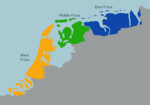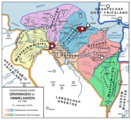
The Frisian languages are a closely related group of West Germanic languages, spoken by about 500,000 Frisian people, who live on the southern fringes of the North Sea in the Netherlands and Germany. The Frisian languages are the closest living language group to the Anglic languages; the two groups make up the Anglo-Frisian languages group and together with the Low German dialects these form the North Sea Germanic languages. However, modern English and Frisian are not mutually intelligible, nor are Frisian languages intelligible among themselves, owing to independent linguistic innovations and foreign influences.
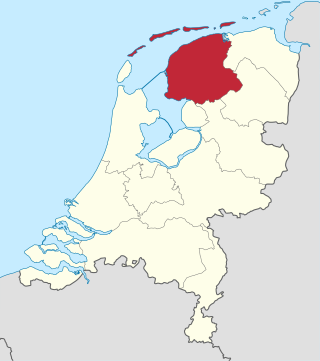
Friesland, historically and traditionally known as Frisia, named after the Frisians, is a province of the Netherlands located in the country's northern part. It is situated west of Groningen, northwest of Drenthe and Overijssel, north of Flevoland, northeast of North Holland, and south of the Wadden Sea. As of January 2020, the province had a population of 649,944 and a total area of 5,749 km2 (2,220 sq mi).
The Frisians are an ethnic group indigenous to the coastal regions of the Netherlands, northwestern Germany and southern Denmark. They inhabit an area known as Frisia and are concentrated in the Dutch provinces of Friesland and Groningen and, in Germany, East Frisia and North Frisia. The name is probably derived from frisselje. The Frisian languages are spoken by more than 500,000 people; West Frisian is officially recognised in the Netherlands, and North Frisian and Saterland Frisian are recognised as regional languages in Germany.

Frisia is a cross-border cultural region in Northwestern Europe. Stretching along the Wadden Sea, it encompasses the north of the Netherlands and parts of northwestern Germany. The region is traditionally inhabited by the Frisians, a West Germanic ethnic group.

West Friesland is a contemporary region in the Northwest of the Netherlands, in the province of North Holland.

West Frisian, or simply Frisian, is a West Germanic language spoken mostly in the province of Friesland in the north of the Netherlands, mostly by those of Frisian ancestry. It is the most widely spoken of the Frisian languages.

Podestà, also potestate or podesta in English, was the name given to the holder of the highest civil office in the government of the cities of Central and Northern Italy during the Late Middle Ages. Sometimes, it meant the chief magistrate of a city-state, the counterpart to similar positions in other cities that went by other names, e.g. rettori ("rectors").
Lex Frisionum, the "Law Code of the Frisians", was recorded in Latin during the reign of Charlemagne, after the year 785, when the Frankish conquest of Frisia was completed by the final defeat of the Saxon rebel leader Widukind. The law code covered the region of the Frisians.
West Frisian can refer to:

Frisian freedom was the absence of feudalism and serfdom in Frisia, the area that was originally inhabited by the Frisians. Historical Frisia included the modern provinces of Friesland and Groningen, and the area of West Friesland, in the Netherlands, and East Friesland in Germany. During the period of Frisian freedom the area did not have a sovereign lord who owned and administered the land. The freedom of the Frisians developed in the context of ongoing disputes over the rights of local nobility.
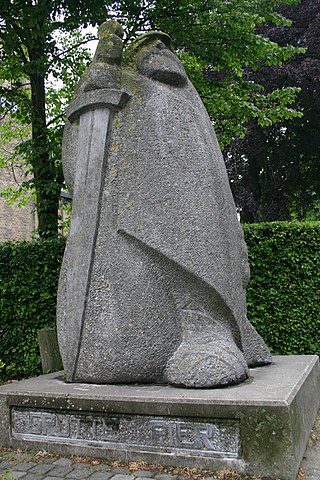
Frisia has changed dramatically over time, both through floods and through a change in identity. It is part of the Nordwestblock which is a hypothetical historic region linked by language and culture,where they may have spoken an Indo-European language which was neither germanic nor celtic.
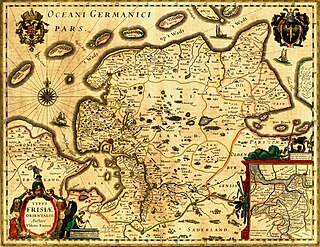
The County of East-Frisia was a county in the region of East Frisia in the northwest of the present-day German state of Lower Saxony.

The Frisian–Frankish wars were a series of conflicts between the Frankish Empire and the Frisian kingdom in the 7th and 8th centuries.

The Frisian Kingdom, also known as Magna Frisia, is a modern name for the post-Roman Frisian realm in Western Europe in the period when it was at its largest (650–734). This dominion was ruled by kings and emerged in the mid-7th century and probably ended with the Battle of the Boarn in 734 when the Frisians were defeated by the Frankish Empire. It lay mainly in what is now the Netherlands and – according to some 19th century authors – extended from the Zwin near Bruges in Belgium to the Weser in Germany. The center of power was the city of Utrecht.
The West Frisians or, more precisely, the Westlauwers Frisians, are those Frisian peoples in that part of Frisia administered by the Netherlands: the Province of Friesland, which is bounded in the west by the IJsselmeer and in the east by the River Lauwers.
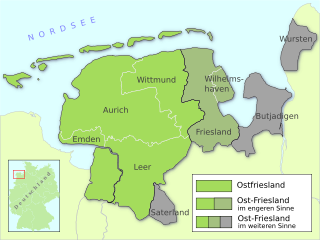
East Frisia is a collective term for all traditionally Frisian areas in Lower Saxony, Germany, which are primarily located on a peninsula between the Dollart and the Jade Bight. Along with West Frisia and North Frisia, it is one of the most commonly used subdivisions of Frisia.
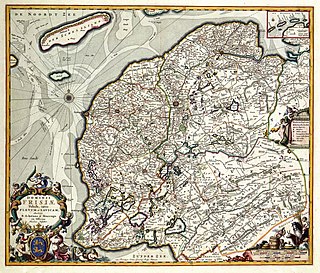
The Lordship of Frisia or Lordship of Friesland was a feudal dominion in the Netherlands. It was formed in 1498 by King Maximilian I and reformed in 1524 when Emperor Charles V conquered Frisia.

The Great Frisian War was an armed conflict in Frisia which lasted nine years in the 15th century, from 1413 to 1422.

Frisian nationalism refers to the nationalism which views Frisians as a nation with a shared culture. Frisian nationalism seeks to achieve greater levels of autonomy for Frisian people, and also supports the cultural unity of all Frisians regardless of modern-day territorial borders. The Frisians derive their name from the Frisii, an ancient Germanic tribe which inhabited the northern coastal areas in what today is the northern Netherlands, although historical research has indicated a lack of direct ethnic continuity between the ancient Frisii and later medieval 'Frisians' from whom modern Frisians descend. In the Middle Ages, these Frisians formed the Kingdom of Frisia and later the Frisian freedom confederation, before being subsumed by stronger foreign powers up this day.


